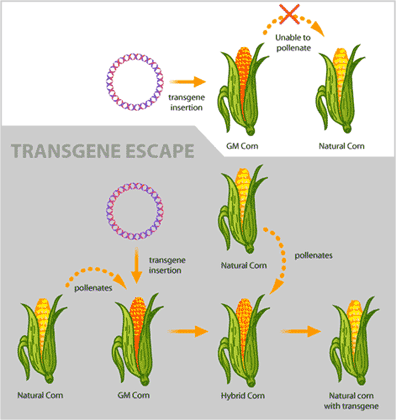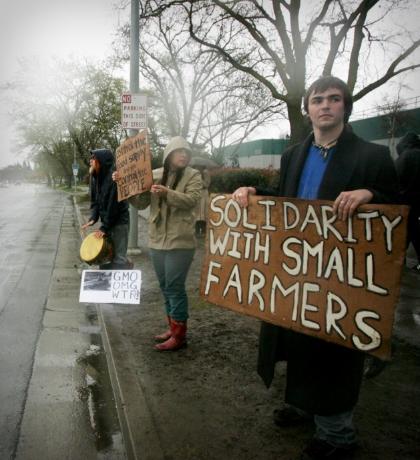Legal and Ethical Conflicts Index (Click Links Below to Skip to Specific Information) |
The possibility that allergenic genes will be inserted into food substances that do not originally induce the genes' respective allergic reactions has sparked outrage. Many fear GM foods may even go as far as to have lethal side-effects on high sensitive individuals. As a result of this growing concern among anti-GM activists, campaigns and protests for Labeling of GM products have emerged. (Citation 41) (Right: Campaign for collecting votes to propose a Proposition in the State Legislature- In front of the Yolo County Public Library, Davis on April 1st, 2012) |  |
 | The trans-gene can potentially escape into other surrounding, related species. Anti-GM protestors fear that herbicide-resistant genes will be transformed into the cells of weed plants, making them resistant to herbicides which would compromise current weed control methods. (Left: Possible scenario of the formation of a Natural Corn species with the transgene) Biodiversity, the range of organisms living in an ecosystem, can also be threatened if GM crops come in contact and breed with non-GM plants. The GM plants, more suitable for the surroundings would be able to out-compete other species and eventually lead to their complete eradication from the ecosystem. (Citation 41) |
The market dominance of the monopoly holding seed giants such as Syngenta and Monsanto puts small-scale farmers at a disadvantage. Anti-GMO opinion is afraid of losing traditional farming and economic practices. However, large scale corporations believe that discontinuation of orthodox practices and a move towards a GM world is essential for the sustenance of 9 billion people in 2050. (Citation 41) Activists also hypothesize that the proprietary nature of biotechnology and protection of patents over claims to certain parts of the DNA code of specific species would halt the rate of research and hinder scientific development. (Right: 'Occupy Monsanto' activists were successful in closing down operations of the Davis, California branch for 1 day, expressing the opposition to Monsanto's monopoly over certain crop seeds in the US) [Full coverage of the event: Protestors Shut Down Monsanto's Davis Facility for a Day: The California Aggie] |  |
The current issue over the ethics of Genetically Modified Foods from 4 different viewpoints: Large-scale corporations, Farmers, Scientists and Activists
(My own High School Biology Ethics Project Video Production with classmates Ross Kelly, Will Ebeler, and Franz Breedon) [2 Parts]
Click on the organization logos below to be directed to their respective websites and learn more about regulatory practices:
Genetically Modified Crop seeds must be approved for release after assessment from the Animal and Plant Health Inspection Service (APHIS),the United States Department of Agriculture (USDA), The Food and Drug Administration (FDA) and the Environmental Protection Agency (EPA).
The sheer number of agencies funded by the government to regulate all GMOs before growth in the environment leads to delay in scientific progress. These regulatory practices are necessary for the Federal government to ensure just treatment of the beliefs of all people despite hindered advancements.



